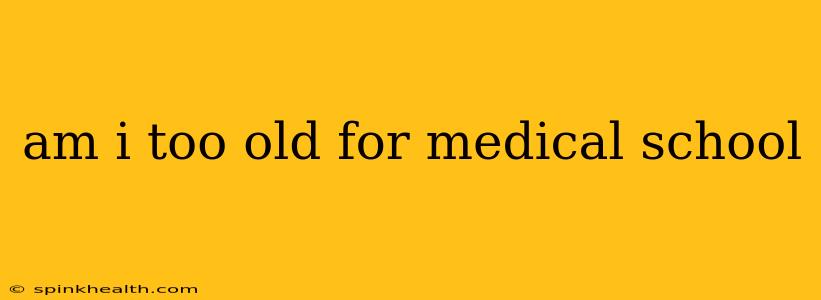Am I Too Old for Medical School? Navigating Age and the Path to Becoming a Doctor
The question, "Am I too old for medical school?" echoes in the minds of many aspiring physicians who might feel the clock ticking against their dreams. It's a valid concern, fueled by societal perceptions and the demanding nature of medical training. But the truth is far more nuanced than a simple yes or no. My journey, and the stories of many successful older medical students, prove that age is often just a number – a detail that doesn't define your potential or passion.
Let's explore this common worry and tackle some of the frequently asked questions that often arise:
What is considered "too old" for medical school?
There's no magic age limit. Medical schools look at the whole applicant, not just their birthdate. While the average age of matriculants tends to be in the early to mid-twenties, successful applicants have ranged from their late twenties to well into their fifties and beyond. The focus is on your maturity, resilience, and commitment to the rigorous demands of medical education. A seasoned individual who has built life experience might even hold certain advantages.
How does age affect the medical school application process?
Age itself doesn't automatically disqualify you. However, your application needs to address any career gaps or life experiences that might seem unusual. A compelling personal statement that honestly reflects your journey, including what drove you to medicine later in life and how these experiences have shaped your perspective, is crucial. It’s about demonstrating how your unique background contributes to your suitability for the profession.
Will I be able to handle the rigorous demands of medical school at an older age?
This is a question you need to honestly assess yourself. Medical school is undeniably intense, demanding long hours, significant mental stamina, and relentless learning. However, life experience often translates to better time management skills, greater self-discipline, and a more mature approach to challenges. Many older students find that their life experience provides them with a resilience and focus that benefits them greatly.
Think about it: the skills you've honed over the years – navigating complex projects, managing stressful situations, or balancing multiple responsibilities – will be highly valuable in medical school. The ability to persevere, which often comes with age and experience, can be your greatest asset.
What are the advantages of being an older medical school applicant?
While there are challenges, being an older applicant also brings numerous advantages. These often include:
- Increased maturity and life experience: You bring a unique perspective, enhanced problem-solving skills, and a deeper understanding of human interaction.
- Stronger sense of purpose: Many older applicants are driven by a clear and unwavering desire to pursue medicine, not simply following a traditional path.
- Improved time management and self-discipline: Years of juggling responsibilities have honed these vital skills.
- Enhanced financial stability: Older applicants may have a more stable financial situation, reducing financial stress during their studies.
- Established network: You may have a built-in support system of friends, family, and mentors who can help you navigate the challenging journey.
How can I overcome potential disadvantages related to age?
The perceived disadvantage of age can be overcome through:
- A compelling personal statement: Clearly and authentically articulating your motivations and addressing any perceived gaps in your application.
- Strong letters of recommendation: Seeking recommendations from those who can attest to your abilities, maturity, and commitment.
- High MCAT scores: Demonstrating your academic prowess and readiness for medical school.
- Meaningful volunteer or shadowing experiences: Highlighting your commitment to medicine and showcasing your abilities.
- Exceptional performance in prerequisite courses: Achieving outstanding grades in the required coursework.
The Bottom Line:
Age shouldn't be a barrier to pursuing your dream of becoming a doctor. Your unique experiences, maturity, and unwavering commitment can be significant assets in the medical school application process and throughout your medical education. Focus on presenting yourself as a well-rounded, dedicated, and resilient individual ready to embrace the challenges ahead. Your story is unique; tell it with passion, honesty, and a deep understanding of why medicine is your calling. It's never too late to pursue your dreams if you have the dedication and the drive.

